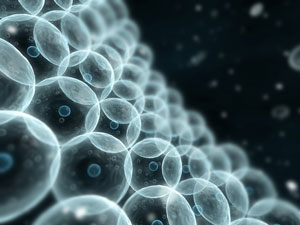
Effects of Turmeric Compounds on Cell Adhesion Molecules Involved in Cancer
| ADHESION MOLECULES AND CANCER | |||
|---|---|---|---|
| HOW DO THEY CONTRIBUTE TO CANCER? AND HOW CAN TURMERIC COMPOUNDS HELP? |
|||
|
Cell adhesion molecules (CAMs) and their receptors are produced by the epithelial cells that form membranes and linings of blood vessels throughout the body. They help hold our cells and organs together in an organized, regulated fashion. (vi.115-116) For example, CAMs link to integrin type receptors and stick to the extracellular matrix that separates organs. Other adhesion molecules link with cadherin receptors, holding cells in contact with their neighboring cells. (vi.115-116) Adhesion Molecules Also Help Cells Communicate with Each Other Adhesion molecules are more than just the glue that holds cells together, however. They also send signals back and forth between the cell and its external environment. These signals serve many purposes, such as helping the immune system respond. (vi.115-116) An example of this during normal immune system activity are when cells produce adhesion molecules in response to an injury. In this role, epithelial cells are stimulated by pro-inflammatory cytokines (such as IL-1 and TNF-α) to produce CAMs. These attract and promote the movement of other immune system cells (such as lymphocytes) to areas of injury. As part of an acute immune system response, cytokines and CAMs are tightly controlled. However, chronic inflammation caused by certain conditions, such as cancer, can produce dysregulated, unhealthy levels of CAMs and their receptors. (vi.115-117) Cancer Needs Adhesion Molecules to Spread In order for cancerous tumors to metastasize to other parts of the body, genes that produce certain cell adhesion molecules that hold cells together must be inactivated on the surface of the cancer cells. For example, cancer cells will suppress integrin receptors and fibronectin molecules that block migration. (vi.47, 117) This allows the cancer cells to dissociate, or break off, from the main tumor. In addition, cancer cells also actively promote other types of adhesion factors, cytokines, and enzymes that promote abnormal migration of cells. (vi.46-47, 89) VCAM-1, ICAM-1, and ELAM-1 are three cell adhesion molecules known to promote this dissociation, allowing cancer cells to migrate and metastasize. They also help with the formation of new blood vessels to feed growing tumors. Studies show turmeric's curcumin compounds can help block these cancer-promoting adhesion molecules. (vi.46-47, 67, 89) |
|||
| SPECIFIC EFFECTS OF TURMERIC COMPOUNDS | |||
| ↓ ELAM-1 | ↓ ICAM-1 | ↓ Selectin | ↓ VCAM-1 |





